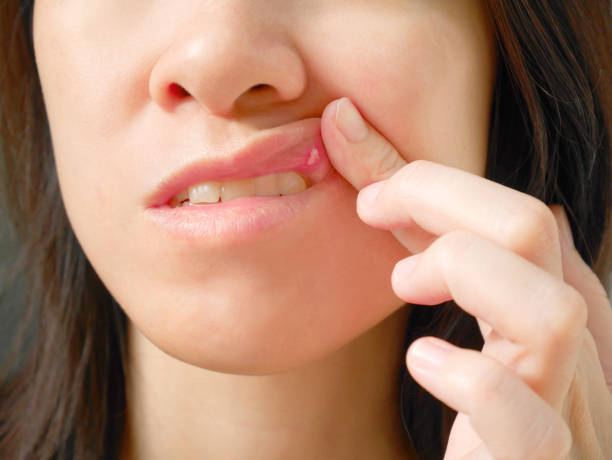You can’t go wrong with these home remedies for canker sores. Just try. Get well soon!
Who doesn’t know them, the mean little blisters in the mouth that cause such unbelievable pain? Canker sores (pronounced aphthae) are mouth blisters, similar to a type of herpes, that not only look ugly but are incredibly painful. Canker sores are sensitive to salt, heat, and cold. Mouth ulcers hurt when chewing, eating, drinking, and speaking, sometimes they even paralyze the facial muscles. You should quickly take necessary medical steps against these small, mean blisters.
So that you can avoid any kind of chemicals in your mouth (you know: medicines often have enormous side effects), we have put together good home remedies for you. Try these home remedies: your health will thank you. Guaranteed without side effects.

1. Baking powder against canker sores
Baking soda kills germs and can prevent inflammation. Simply mix baking soda with a little water and apply to the mouth blisters with a brush. The baking soda solution may burn a bit aggressively in the mouth, but it fights bacteria. So the aphthae slowly fade away with repeated use every day. If baking powder seems too aggressive for you, you can also mix and dab on Kaiser Natron as a powder.
2. Basil works
The spicy herb not only freshens up your offices. Basil protects against bacteria in the mouth and kills germs. Simply chew up several leaves of fresh basil at least twice a day and let them soak in your mouth. The essential oils have a healing effect.
3. Honey for sore throat and mouth sores
The healing properties of honey are well known. Honey works against germs in the mouth’s saliva. It doesn’t matter whether they are tormenting cracks in the mouth or aggressive burning pain caused by aphthae: honey heals. Manuka honey is particularly efficient. How do you use honey in the mouth against the blisters? For the antiseptic effect, apply pure Manuka honey directly to the blister and let it take effect. Apply this at least three times a day. If you want to use honey as a mouthwash, rinse your mouth several times a day with lukewarm water in which a tablespoon of honey has been dissolved.
Manuka honey is particularly effective against mouth ulcers because it contains traces of antibiotics.
4. Fresh ginger against canker sores
Fresh ginger is anti-inflammatory. The spiciness of the ginger root kills bacteria and at the same time reduces nausea and thus your well-being.
How do you apply the ginger root? Simply cut fresh ginger into slices and let it act directly on the mouth ulcer. This relieves pain and kills germs.
If you want it milder, you can prepare your own mouthwash with ginger. To do this, pour hot water over the finely grated root and let it steep for at least an hour. Rinse your mouth with this solution several times a day.
5. Sea salt helps against canker sores
Sea salt is a miracle salt of nature and is not only suitable for skincare. Sea salt has a disinfecting and antiseptic effect if you let it act directly on the canker sore. The anti-inflammatory effect is noticeable, the oral mucosa is freed from bacteria. If you want to prepare a solution with sea salt for your daily mouthwash, stir at least two tablespoons of sea salt into warm water, which you use as a healing mouthwash as often as possible.
At least after every meal, the mouth should be sufficiently disinfected with the seawater rinse.
6. Tea tree oil against the sore mouth blisters

Tea tree oil is often used in medicine as a well-known home remedy for inflammation. It can also provide pain relief for aphthae. Simply dab a few drops of tea tree oil directly onto the affected areas of your mouth using a cotton swab. Let the healing oil work its magic on the blisters and rub it lightly into the oral mucosa.
Two to three applications a day should be enough for pain relief to occur after a few days. Tea tree oil – is a proven natural remedy for all types of inflammation.
7. Cinnamon against canker sores
Cinnamon can provide pain relief. Cinnamon provides short-term numbness in the mouth. In addition, cinnamon stimulates blood circulation, which means that the tissue of the oral mucosa is better supplied with blood. For this reason, some mouthwashes contain substances from cinnamon. However, too much of the good spice can lead to overreactions. Therefore the first test is what is good for you. If you want, you can, for example, add a teaspoon of cinnamon to the honey mouthwash to test the effect on yourself.
